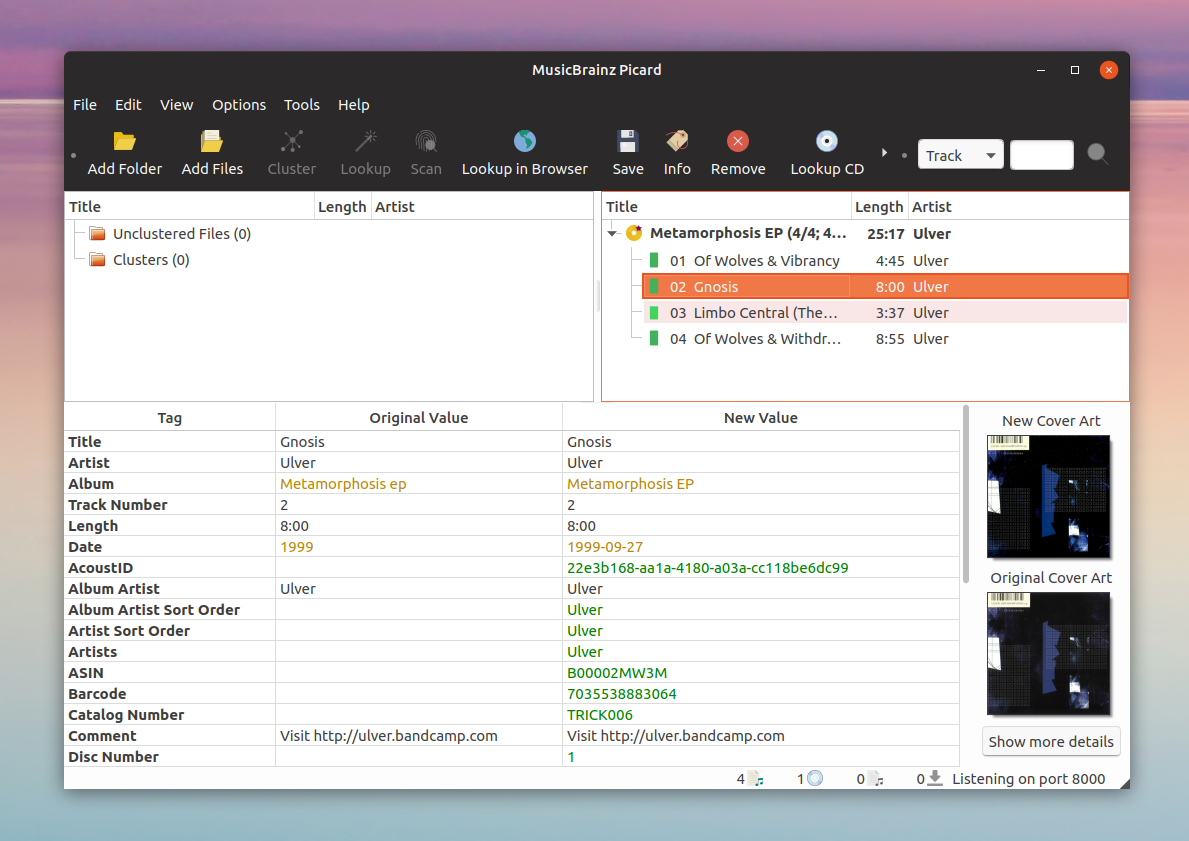
- MUSICBRAINZ PICARD TAGGER NOT WORKING SOFTWARE
- MUSICBRAINZ PICARD TAGGER NOT WORKING CODE
- MUSICBRAINZ PICARD TAGGER NOT WORKING SERIES
In 2018, Picard 2.0 was released with support for Python 3, PyQt5 and a new and improved UI. In 2017, Picard's development version was made available on PyPi, supporting Windows, Linux and macOS. In 2009, Picard's developers replaced the MusicDNS acoustic fingerprinting system with AcoustID. artists, album, year Music Tag - Automatic MP3 Tagger.
MUSICBRAINZ PICARD TAGGER NOT WORKING SOFTWARE
The developers also switched from a software library called wxPython to another called PyQt, and ported Picard to the operating systems Linux and macOS. Only one problem Can you guys add the ability for dark mode on iOS 12 I have an iPod touch and I. When the new software identified tracks, it grouped them by album in a collapsible tree view.

With funding from RealNetworks, MusicBrainz developers designed a new user interface for Picard.

Although Kaye intended the name Picard to be temporary, MusicBrainz Picard remains the official name of the program.
MUSICBRAINZ PICARD TAGGER NOT WORKING SERIES
Since Kaye was trying to make a "next-generation tagger", he thought of the science fiction television series Star Trek: The Next Generation, in which Patrick Stewart plays the role of Captain Jean-Luc Picard.
MUSICBRAINZ PICARD TAGGER NOT WORKING CODE
Īs a sponsor of the development project, RealNetworks asked Kaye to come up with a project code name. Streaming media company RealNetworks took an interest in MusicBrainz, and gave the developers a grant to improve the Tagger software. However, Kaye saw that it needed cosmetic and functional improvements. This early incarnation of the program could identify songs based on tags or MusicDNS acoustic fingerprints. This time we are announcing the release of a new Picard Official MusicBrainz cross-platform music tagger Picard 2.0 is now out, containing many fixes and new features and much needed upgrades The last time we put out a major release was more than 6 years ago (Picard 1.0 in June of 2012), so this release comes with a major back-end update. It was developed in the Python programming language, and ran only on Microsoft Windows operating systems. Picard began as a tag editor called the MusicBrainz Tagger, which was the work of MusicBrainz founder Robert Kaye and other volunteers. It is named for Captain Jean-Luc Picard, a character in the US television series Star Trek: The Next Generation. MusicBrainz Picard has tag editing features, and is extensible with plug-ins. The more information the database has about a recording, the more Picard can embed in users' audio files. The source of this information is the MusicBrainz database, which is curated by volunteers. In some cases, it can also add more detailed information, such as lists of performers and their instruments. When Picard identifies an audio file, it can add new information to it, such as the recording artist, the album title, the record label, and the date of release. Audio file metadata (or "tags") are a means for storing information about a recording in the file. Picard identifies audio files and Compact Discs by comparing either their metadata or their acoustic fingerprints with records in the database. It was developed by the MetaBrainz Foundation, a non-profit company that also operates the MusicBrainz database.

MusicBrainz Picard is a free and open-source software application for identifying, tagging, and organising digital audio recordings.


 0 kommentar(er)
0 kommentar(er)
